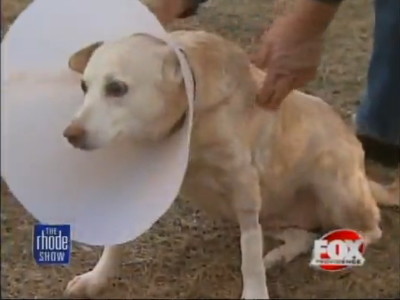Baby tongue incision business is booming

Lingual frenulum is a congenital abnormality in which the lingual frenulum on the back of a baby's tongue is short, restricting tongue movement. The New York Times reports that the business of tongue incisions to treat this condition has increased rapidly over the past decade.
Tongue Tie Surgery: Inside the Business of Cutting Babies' Tongues - The New York Times
https://www.nytimes.com/2023/12/18/health/tongue-tie-release-breastfeeding.html
After breastfeeding three babies, Tess Merrell faced a problem with her fourth baby, who wasn't feeding as well. When Merrell asked lactation consultant Melanie Henstrom for help, she was told that the problem was that the infant's tongue was connected to the floor of the mouth. 'This is a common problem and can be resolved with a simple procedure at the dentist,' Henström said.
Merrell followed instructions and used a laser to cut the baby's tongue in December 2017. However, after the procedure, the baby began refusing to eat and became dangerously dehydrated.
A condition in which an infant's tongue remains stuck in the mouth, like Merrell's baby did, is called ``tonus ligamentum.'' In recent years, women have been under increasing pressure to breastfeed their infants, and the business of cutting the baby's tongue in order to improve this condition has exploded over the past 10 years. .
An investigation by The New York Times reveals that lactation consultants and dentists are recommending the procedure, even if the tongue is not connected to the floor of the mouth, advising that a baby's tongue should be incised. became.

Some babies are born with the tip of their tongue attached to the floor of their mouth. In some cases, an incision is made at the junction to address this, but in most cases it is harmless to leave it alone, and
Some lactation consultants and dentists offer advice to anxious and exhausted mothers like Merrell to improve breastfeeding and prevent health problems such as sleep apnea and speech disorders in babies. Some people recommend making an incision in the baby's tongue for this purpose.
Some people recommend applying the laser not only to the tongue, but also to the area where the lips and cheeks connect to the gums. Diagnosing and dissecting these connections in the mouth is rapidly expanding into a niche business that costs tens of thousands of yen.

Scott Siegel, a well-known Manhattan dentist, has been performing tongue incisions on babies for 20 years and sees up to 100 patients a week. Each tongue incision surgery takes about 5 minutes, and the company charges $900 (approximately 130,000 yen). The New York Times interviewed Mr. Siegel as he performed tongue incision surgery on three infants.
According to The New York Times, some dentists make millions of dollars (hundreds of millions of yen) a year from tongue incisions. The New York Times points out that lactation consultants who refer patients are also paid referral fees, and medical device manufacturers that make lasers for tongue incisions are also cashing in on this trend.
Siegel acknowledges that there is little medical research to support tongue incision surgery, but in his own experience tongue incisions improve feeding problems in infants and improve health problems such as sleep apnea. It also claims to be improved.
Since tongue incisions are often not covered by insurance, it is extremely difficult to count the number of surgeries performed, but ``no matter how you look at it, the number is rapidly increasing,'' The New York Times says. is written. Between 1997 and 2012, the number of tongue incision surgeries performed in the United States has increased by more than 800%, and the number of surgeries per year is expected to exceed 12,000.
In 2020, a large clinic in New Jersey sent an email to patient families warning that 'babies are being irradiated with lasers to cut their tongues at an alarming rate.' In 2021, another clinic in Kentucky warned of possible after-effects from tongue incisions, saying, ``After laser treatment, the baby refused to eat and complained of severe pain.'' In this way, some doctors criticize the tongue incision business, calling it a convenient way to extract money from the child-rearing generation.
Although serious side effects from tongue incision surgery are rarely reported, doctors say there have been cases where the cut can cause severe pain, causing babies to refuse to eat, become dehydrated, or suffer from malnutrition. is. In addition, there are cases in which the tongue ends up blocking the baby's airway by cutting a part of the baby's tongue. It is said that some parents who have had a tongue incision develop depression from feeling guilty after seeing their baby suffering from the after-effects.
Unlike most medical fields, the baby tongue cutting business operates with little oversight. Although the American Dental Board receives complaints from the public, it seems that there are very few cases that result in the suspension of a dentist's license. Additionally, there are only three states in the United States that regulate lactation consultants.
Henstrom, the lactation consultant who appeared in the case mentioned at the beginning, has received multiple complaints from medical professionals and customers, but she continues to work as a lactation consultant at the time of writing. When The New York Times contacted Henstrom directly, she said, 'Literally thousands of people are excited to be my lactation consultants,' highlighting the success of her work as a lactation consultant. Did. However, he did not respond to any questions from The New York Times.

The idea that keeping the tongue connected to the mouth prevents breastfeeding has existed for centuries. Midwives used to use long, sharp nails to physically tear the tissue under a baby's tongue, and there is even a record of a French royal surgeon incising the tongue of newborn King Louis XIII in 1601. remain.
However, there have long been a number of doctors who have warned against this surgery. In 1791, a German obstetrician wrote, ``Parents are often deceived for profit or ignorance,'' and ``this procedure is abused, and in some cases incisions are made where nothing is connected.'' I am.
With the advent of mass-produced powdered milk in the 20th century, the popularity of breastfeeding waned, and discussions about lingual frenulum in babies almost disappeared. However, with the resurgence of breastfeeding's popularity in the 1970s, the tongue cutting business gradually returned.
Lingual frenulum is a problem in breastfeeding because infants need to use their tongue to suckle breast milk. According to Allison Hazelbaker, a lactation consultant who was active in the 1980s, some of the babies she diagnosed at the time were clearly having problems with breastfeeding due to ligament, but pediatricians It seems that he was barely aware of the symptoms. This situation contributes to the popularity of the profession of lactation consultant. In addition, in 1993, Hazel Baker developed a tool to evaluate whether lingual frenulum shortening can be confirmed in babies, and this is said to be in use at the time of writing the article.
Furthermore, in 2004, the American Academy of Pediatrics published an article on lingual frenulum in babies, which made this condition widely known. However, with the rapid increase in diagnoses related to lingual frenulum, it has been pointed out that the number of incorrect diagnoses is also increasing, and guidelines have been published warning of this fact.
Breastfeeding, with or without surgery, often improves over time, so it can be very difficult to determine whether or not the cause of an infant's inability to latch onto breast milk is ligamentum. However, it may be inevitable that the tongue incision business will gain popularity, as parents who have had tongue incisions believe that breastfeeding has become easier thanks to the tongue incision. Additionally, research has shown that performing a tongue incision on a baby reduces the pain in the mother's nipples when breastfeeding, so it is certain that it can be expected to have some effect.
Related Posts:
in Note, Posted by logu_ii







